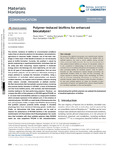Mostrar o rexistro simple do ítem
Polymer-Induced Biofilms for Enhanced Biocatalysis
| dc.contributor.author | Adoni, Pavan | |
| dc.contributor.author | Romanyuk, Andrey | |
| dc.contributor.author | Overton, Tim W. | |
| dc.contributor.author | Fernández-Trillo, Paco | |
| dc.date.accessioned | 2023-05-11T14:54:03Z | |
| dc.date.available | 2023-05-11T14:54:03Z | |
| dc.date.issued | 2022-07-21 | |
| dc.identifier.citation | P. Adoni, A. Romanyuk, T. W. Overton and P. Fernandez-Trillo (2022). Polymer-induced biofilms for enhanced biocatalysis. Mater. Horiz., 9, 2592-2602. DOI: 10.1039/D2MH00607C | es_ES |
| dc.identifier.issn | 2051-6355 | |
| dc.identifier.uri | http://hdl.handle.net/2183/33062 | |
| dc.description | Electronic supplementary information (ESI) available: Full experimental details, including polymer synthesis and characterization, biofilm quantification using cristal violet, curli expresión using GFP reporter, spectrophotometric cell clustering and sizing of polymer-bacteria aggregates, biocatalysis and metabolic activity. (https://www.rsc.org/suppdata/d2/mh/d2mh00607c/d2mh00607c1.pdf) | es_ES |
| dc.description.abstract | [Abstract] The intrinsic resilience of biofilms to environmental conditions makes them an attractive platform for biocatalysis, bioremediation, agriculture or consumer health. However, one of the main challenges in these areas is that beneficial bacteria are not necessarily good at biofilm formation. Currently, this problem is solved by genetic engineering or experimental evolution, techniques that can be costly and time consuming, require expertise in molecular biology and/or microbiology and, more importantly, are not suitable for all types of microorganisms or applications. Here we show that synthetic polymers can be used as an alternative, working as simple additives to nucleate the formation of biofilms. Using a combination of controlled radical polymerization and dynamic covalent chemistry, we prepare a set of synthetic polymers carrying mildly cationic, aromatic, heteroaromatic or aliphatic moieties. We then demonstrate that hydrophobic polymers induce clustering and promote biofilm formation in MC4100, a strain of Escherichia coli that forms biofilms poorly, with aromatic and heteroaromatic moieties leading to the best performing polymers. Moreover, we compare the effect of the polymers on MC4100 against PHL644, an E. coli strain that forms biofilms well due to a single point mutation which increases expression of the adhesin curli. In the presence of selected polymers, MC4100 can reach levels of biomass production and curli expression similar or higher than PHL644, demonstrating that synthetic polymers promote similar changes in microbial physiology than those introduced following genetic modification. Finally, we demonstrate that these polymers can be used to improve the performance of MC4100 biofilms in the biocatalytic transformation of 5-fluoroindole into 5-fluorotryptophan. Our results show that incubation with these synthetic polymers helps MC4100 match and even outperform PHL644 in this biotransformation, demonstrating that synthetic polymers can underpin the development of beneficial applications of biofilms. | es_ES |
| dc.description.sponsorship | P. F.-T. thanks the University of Birmingham for the John Evans Fellowship and the Spanish Ministerio de Educación, Cultura y Deporte for a Beatriz Galindo Award [BEAGAL18/00142]. P. A. thanks the BBSRC's Midlands Integrative Biosciences Training Partnership MIBTP (BB/M01116X/1) for a PhD scholarship and A. R. thanks the European Union's Horizon 2020 Research and Innovation Programme (Marie Sklodowska-Curie Grant Agreement No. 795082) | es_ES |
| dc.description.sponsorship | Reino Unido. Biotechnology and Biological Sciences Research Council; BB/M01116X/1 | es_ES |
| dc.description.uri | https://www.rsc.org/suppdata/d2/mh/d2mh00607c/d2mh00607c1.pdf | |
| dc.language.iso | eng | es_ES |
| dc.publisher | Royal Society of Chemistry | es_ES |
| dc.relation | info:eu-repo/grantAgreement/MCIU/Plan Estatal de Investigación Científica y Técnica y de Innovación 2017-2020/BEAGAL18%2F00142/ES/ | es_ES |
| dc.relation | info:eu-repo/grantAgreement/EC/H2020/795082 | es_ES |
| dc.relation.uri | https://doi.org/10.1039/D2MH00607C | es_ES |
| dc.rights | Atribución 3.0 | es_ES |
| dc.rights.uri | http://creativecommons.org/licenses/by/3.0/es/ | * |
| dc.title | Polymer-Induced Biofilms for Enhanced Biocatalysis | es_ES |
| dc.type | info:eu-repo/semantics/article | es_ES |
| dc.rights.access | info:eu-repo/semantics/openAccess | es_ES |
| UDC.journalTitle | Materials Horizons | es_ES |
| UDC.volume | 9 (2022) | es_ES |
| UDC.issue | 10 | es_ES |
| UDC.startPage | 2592 | es_ES |
| UDC.endPage | 2602 | es_ES |
| dc.identifier.doi | 10.1039/D2MH00607C |
Ficheiros no ítem
Este ítem aparece na(s) seguinte(s) colección(s)
-
GI- NANOSELF4BIO - Artigos [45]
-
OpenAIRE [359]






